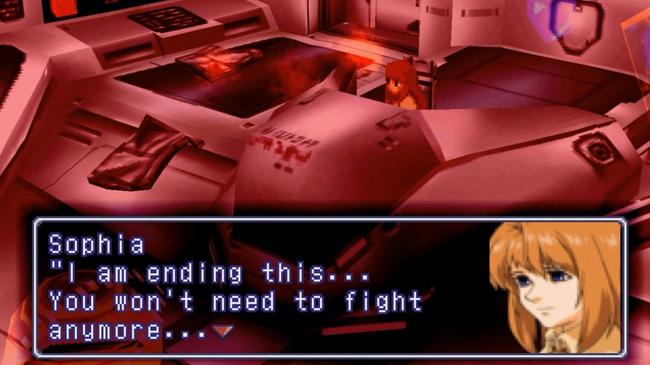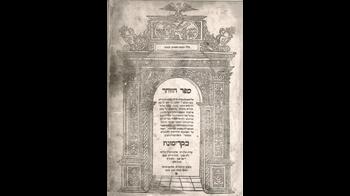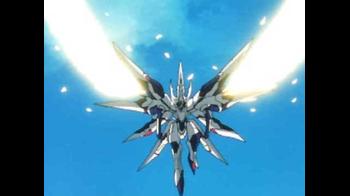
Stand Tall and Shake the Heavens: The Portrayal of Religion in Xenogears
Warning: this article contains story spoilers for Xenogears
Xenogears is a fascinating game that dares to explore the boundaries of traditional RPG storytelling. At the time of its release, it was controversial in the way it portrayed its religious themes and symbolism, something that is rarely seen in the genre.
Due to its intricate and multi-faceted plot, many who have played the game may have failed to grasp the many layers because of its grandiose narrative. In fact, it’s easy to come away from the game thinking it to be nothing more than an epic love story when romance is simply the supplement to its spiritual motifs. With that in mind, I will try my best to keep things as simplistic as I can to not overwhelm those who seek to learn more.
Right away, we get a strong idea of where the story of Xenogears will take us. The game begins with the phrase, “I am Alpha and Omega, the beginning and the end, the first and the last.” This comes from the Book of Revelation in Christianity’s holy bible - chapter 22, verse 13 in the New Testament.
While the precise source of this quote is up for debate in many circles outside of him being a Christian prophet, many scholars believe it to come from John the Apostle. In it, he shares the prophecies he has envisioned which lead up to the second coming of Jesus. Alpha and Omega represents the belief God is around from the beginning to the end of time.
Shortly after this phrase appears on the screen, we get a view of a massive ship called the Elridge who is transporting an entity known as the Deus. The Eldridge is soon plunged into chaos after Deus attempts to take control of the ship itself. The captain of the ship decides to initiate the self-destruction sequence to prevent its cargo including Deus from entering open space. The ship proceeds to crash-land on to a planet's surface, the same one where Xenogears takes place. This all takes place 10,000 years before the events of the game.
Many pieces of the ship, including Deus and the Zohar Modifier, land on the planet. Deus, damaged from the fall, uses its regenerative program to take on a human form, the mother of humanity, from which all life is created. The purpose of this is to harvest enough biological tissue to reincarnate Deus. All the technology found in Xenogears originates from parts of the Eldridge, leading to technologically advanced societies such as Zeboim. Other examples of technology created from the salvaging of the ship include Babel Tower, Mahanon, and Merkava.
For those who aren’t aware, the Zohar is the name of the manuscript that served as the basis for the Torah, or the Jewish Bible, which was written back in the thirteenth century. One of the Zohar’s major themes is how there is a duality between those who take the bible literally and those who seek a deeper knowledge through the scriptures for enlightenment, also known as the body versus the soul of the text, respectfully. That same line of thinking is used in Xenogears where Deus represents the body, the literal interpretation, and the Existence Wave is the soul or the deeper understanding.
Throughout the story, we meet certain characters who offer their own interpretations of what the Zohar presents. For example, how people construe the “God” founded by the religion of Nisan. With the way it’s presented, the Nisan’s God is, in fact, the more spiritual perception of the Zohar. Sophia, the first Mother of the Nisan Orthodoxy, even states, "Faith in God. Do not look for it on the outside. For it is something one must build from within oneself."
After Sophia sacrifices herself for her people, Krelian questions the existence of “god” over how it would allow such a great deal of bloodshed upon its people. Amid his grief and emotional pain, Krelian turns his back on the church and instead sought a god that was more clearly described in the Zohar. This led him to the discovery of Deus, whom he dedicates his life towards from then on.

Nanotechnology also plays on this same concept of the body versus the soul of the Zohar. During the Zeboim era, Kim and Elly use the power of nanotechnology to create a child. But they also used it to symbolically connect with each other as they used the science to combine their DNA. Those who have played the game are fully aware how important the relationship between these two characters is throughout the story.
Meanwhile, Krelian was using this same technology to further the nefarious goals of Solaris by creating artificial life forms to serve his own purposes. It became clear he no longer held any devotion to the human race. So if we break it down, Kim and Elly (who later became Fei and Elly) sought spiritual collaboration; in another way, human beings need one another to complete the soul. This is shown in the Nisan Sanctuary where two one-winged angels, one male and one female, are holding hands to signify human togetherness - an embodiment of the soul. Krelian only cared about his connection to God.
Xenogears doesn’t always serve as a good foundation for attempting to compare an in-game religion to a real-life counterpart, but it doesn’t appear this is what the writers were attempting to convey in the first place. But it’s easy to see the prevailing religion represented here is wholly Judeo-Christian in design.
Many wars have been fought over the literal versus figurative interpretation of the Holy Bible, but the approach is still two sides of the same coin. This particular concept comes into play at the end of the story where we learn the Uroborus gene represents this connection between the body and the soul of the Zohar: Elly serves as the soul of the Zohar while Miang is the body. In a sense, the Uroborus Gene is the personification of what religion says and what the concealed message can be interpreted as.
At this point of the game, the two halves of the Miang gene (Miang and Elly) rejoin which represented Deus defeating the Existence Wave, or the body taking over the soul. The moment Deus awakens is the interpretation of the aforementioned second coming of Jesus. Fei, determined to save Elly from Deus, is given the ability to pilot the Xenogears.
It turns out Fei is the only person who can now pilot a gear after all the others stopped working because they required the Zohar to function. Xenogears is different because it is powered by Fei’s soul. This leads to the discovery that the gears were powered by the Anima, or the soul of the pilot. Fei’s decision to pilot Xenogears represented his spiritual independence from religion because it didn’t need the Zohar to operate. That isn't to say Xenogears is necessarily anti-Christian with this portrayal, but instead promotes the key values from Christianity like how all people deserve dignity and all people are created equal. In this approach, it's humanist in nature by encouraging people to look towards their innermost feelings.
Shortly after the battle with Uroborus, we find Krelian who is found himself in a state of deep repent after the atrocities he committed to the revival of Deus, stating he had already lost his humanity (and also his genitalia). However, it is too late for him to go back on his sins. He even goes so far as to say, "The only one who could have forgiven me is God," though his intent is rather ambiguous. From there, he proceeds to grow two angel wings. This shows he did not need humans to complete himself, but rather only his connection to God. Shortly after, Xenogears sprouts wings of its own with Fei and Elly inside, showing how they found their final form of completeness with one another.
While Xenogears explores many other themes aside from religion, it is certainly the prevailing theme throughout much of its narrative. This showed Fei and Elly did not need religion to develop a very strong bond with each other and thus their true soul. Even Nisan, who interpreted the Zorah as human togetherness, still refused to disconnect itself from the body. It was only with the Zohar’s complete destruction that they were able to seek true enlightenment - mankind’s connection and existence.

